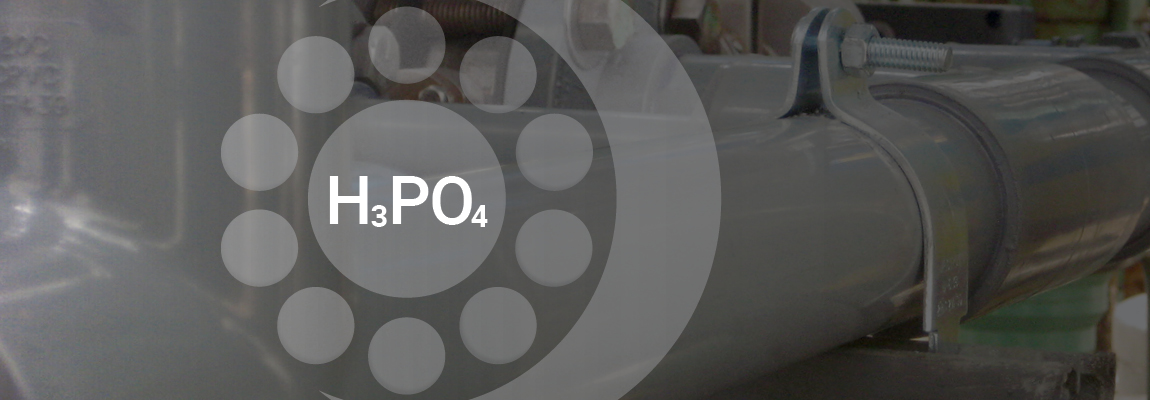Why Corzan® CPVC is Ideal for Phosphoric Acid Processing
The following is adapted from “CPVC Use in the Chemical Processing Industry.” Download the full ebook to learn more about where CPVC can be used in the chemical processing industry, which chemicals CPVC stands up against and how CPVC compares to alternatives in various applications.
The global chemical processing industry amassed a total revenue of over $4.7 trillion (USD) in 2021. With 40,000 existing facilities worldwide—and thousands more planned—the chemical processing industry (CPI) is becoming increasingly competitive.
Chemical processing is broadly defined as the chemical conversion of raw materials to finished products, including:
- Traditional chemicals, both organic and inorganic
- Petroleum, petrochemical and refining
- Battery manufacturing and recycling
- Pharmaceutical facilities
- Marine support and offshore
In this growing sector, plant managers and engineers seek systems that are more cost effective, reliable and specially engineered to meet their processes’ demands. Safety and durability are essential in this industry, which relies on chemicals that quickly corrode many materials and that are hazardous to humans. Some harsh chemicals commonly used in chemical processing include:
- Sodium hypochlorite (bleach)
- Hydrochloric acid
- Sulfuric acid
- Sodium chloride
- Sodium hydroxide (caustic soda)
- Phosphoric acid
Especially at high concentrations and temperatures, these chemicals aggressively corrode pipes and tanks, which can create leaks and premature failures. Let’s examine how one chemical – phosphoric acid – impacts the piping materials in a chemical processing plant.
Metal Piping and Phosphoric Acid
Many plants traditionally use alloys, such as carbon steel or stainless steel. These metals offer inherent strength and, most importantly, the industry is familiar with their performance strengths and weaknesses. For corrosive chemicals like phosphoric acid, however, carbon steel is the not the right choice. Phosphoric acid is highly corrosive to this material, and the weakened pipes may require regular replacement every few years. Grade 316 Stainless Steel is generally resistant to acidic corrosion but comes with a high material, installation and maintenance cost. Superalloys like Incoloy 825 and Monel 400 provide excellent resistance to chemical corrosion but are even more expensive than stainless steel and are difficult to source.
Plastic Piping and Phosphoric Acid
Many nonmetallic materials are ideally suited for chemical processing applications. These systems can operate reliably for decades, resulting in material cost savings, installation cost savings and less downtime. But the material expense varies widely.
Many specialty plastics provide reliable phosphoric acid performance. PVDF (Polyvinylidene fluoride) and PVDF lined pipe can be used for concentrations up to 85% but is a significantly costlier material and is under extra regulatory scrutiny. PP (polypropylene) and PP-R (polypropylene random co-polymer) can be used with phosphoric acid in concentrations up to 85%, but special fusion equipment is needed.
Chlorinated polyvinyl chloride (CPVC) is a specially engineered thermoplastic that has become an industry standard material. It satisfies the need for reliable piping systems and provides a balance between performance and costs. The corrosion-resistant chemistry behind Corzan® CPVC is its high level of chlorine on the polymer chain, which protects the CPVC from the degrading effects of corrosive acids. Because of this, Corzan CPVC offers excellent corrosion resistance to a broad range of chemicals, and better impact strength and temperature resistance than many other nonmetallic materials. Corzan CPVC protects against the oxidizing potential of strong acids like sulfuric acid and weaker acids like phosphoric acid, which reacts with metal to form corrosive metal phosphate salts.
Where Else Can Corzan CPVC Be Used in Chemical Processing Plants?
With a wide chemical resistance range, superior performance attributes and extensive approval across key industry standards, Corzan CPVC is frequently specified in the following chemical processing applications:
- Potable water, reclaimed and demineralized/reverse osmosis (DI/RO) water
- Condensate water transfer
- Eye wash and shower stations
- Facility unloading stations for key acids and bases
- Facility chemical distribution piping
- Process transfer lines or injection lines for acids and bases
Corzan CPVC for Long-Term Piping System Reliability
Corzan CPVC has been tested against over 500 chemicals and compounds to determine its suitability. It has been proven for longer service life against the chemical processing industry’s most used corrosive chemicals, including phosphoric acid. In fact, phosphoric acid is among the top 10 chemicals that specifying engineers choose Corzan CPVC to reliably handle. Learn about the science behind Corzan CPVC’s superior performance against phosphoric acid.

